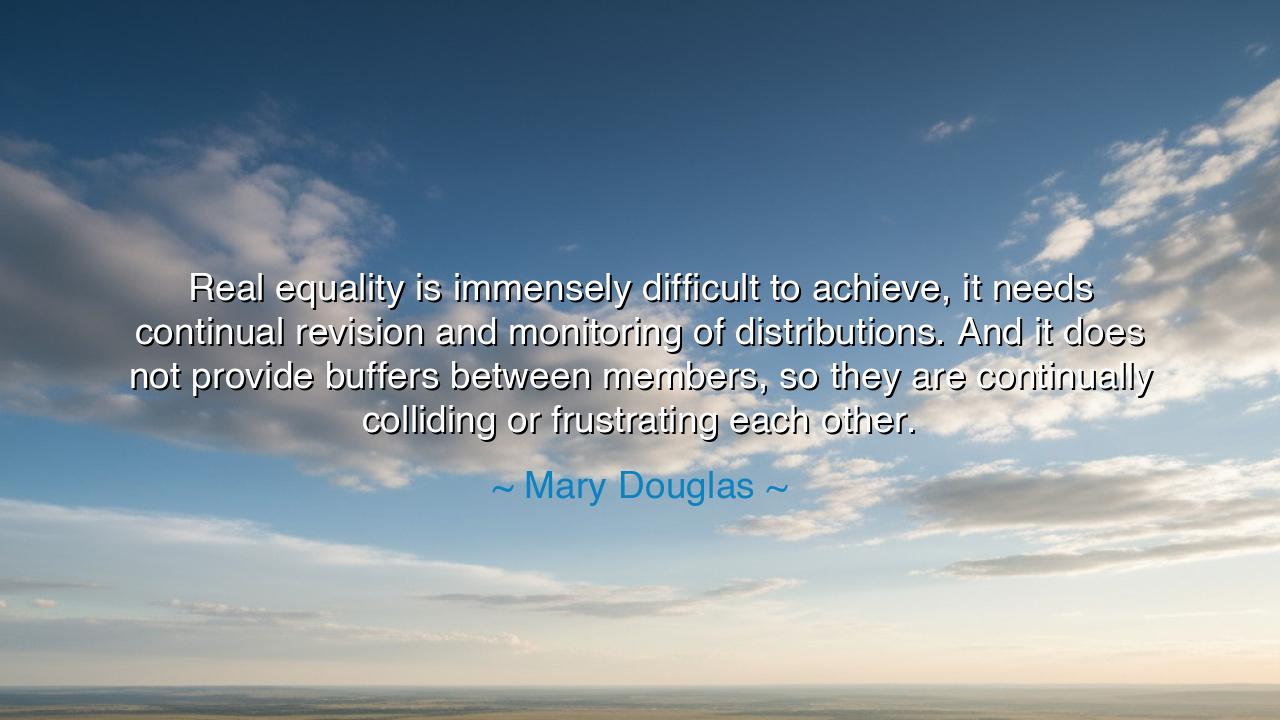
Real equality is immensely difficult to achieve, it needs
Real equality is immensely difficult to achieve, it needs continual revision and monitoring of distributions. And it does not provide buffers between members, so they are continually colliding or frustrating each other.






The voice of Mary Douglas, wise anthropologist of the twentieth century, speaks with unflinching honesty: “Real equality is immensely difficult to achieve, it needs continual revision and monitoring of distributions. And it does not provide buffers between members, so they are continually colliding or frustrating each other.” These words pierce the illusions of those who dream of equality as an easy blessing, falling like rain upon all people without struggle. She reminds us that real equality is not a gift bestowed once and forever—it is a fragile balance, ever threatened by the weight of pride, envy, and human restlessness.
To the ancients, equality was always a paradox. The Greeks, though lovers of democracy, could not extend it beyond their male citizens. The Romans, though masters of law, divided their society into patricians and plebeians. Even in revolutions that shook the earth, men proclaimed the brotherhood of all, while in practice they preserved hidden hierarchies. Douglas unveils why: true equality strips away the barriers that cushion us from one another. It compels us to stand shoulder to shoulder, where every slight is felt, every difference magnified. Without the walls of rank and privilege, people collide more easily, struggling to define their space.
We may look to the French Revolution as a living parable. In 1789, the cry of liberty, equality, fraternity thundered through the streets. The old order of kings and nobles fell, and all were declared equal citizens of the republic. Yet, as Douglas foresaw, equality brought with it frustration and collision. Factions tore at one another, moderates against radicals, Jacobins against Girondins. Each man, stripped of titles, now demanded recognition in voice and power. Without the buffers of aristocracy or tradition, society entered a new chaos, where the will of the majority became the tyranny of the moment. Equality had been declared, but harmony was far from achieved.
This is the wisdom of Douglas: real equality is not self-sustaining. It requires vigilance, a ceaseless tending, like the careful balancing of weights upon a scale. Distributions of wealth, voice, and power must be watched and revised, lest imbalance creep back in silently. For human nature ever seeks advantage; one rises, another is pushed down, and soon the dream of equality hardens again into hierarchy. Thus, equality is not a permanent state but a continual labor, a discipline of justice renewed in each generation.
Yet let us not despair at this struggle. For though it is difficult, though it breeds collisions, the pursuit of equality remains one of humanity’s noblest callings. The frustrations are the price of freedom, the cost of standing as peers rather than subjects. In a society of equals, one cannot retreat behind privilege; one must confront the neighbor directly, negotiate, compromise, and forgive. The very friction that equality creates is the furnace in which patience, humility, and true solidarity are forged.
The lesson is clear: do not imagine that equality will descend effortlessly, like sunlight through the clouds. Instead, see it as a garden that must be tended daily. Revise your own distributions—your time, your wealth, your respect—so that none around you is starved of dignity. Monitor the ways you hold advantage, and ask whether you use it to shield yourself or to lift another. And when collisions come, do not curse them as signs of failure, but embrace them as proof that you stand among equals, where every voice matters and every soul is felt.
Practical wisdom flows from this: in your communities, in your households, in your workplaces, strive not for the illusion of effortless harmony, but for the courageous labor of fairness. Welcome the clash of equals, for it teaches resilience. Revise your practices often, for the world shifts and justice must shift with it. Above all, remember that real equality is not the absence of conflict, but the presence of dignity for all. It is immensely difficult, yes—but it is also immensely worth the struggle.
So let these words of Mary Douglas endure: equality is not a destination but a road, winding and steep, where collisions are certain, but where the journey itself ennobles the traveler. Walk that road with vigilance, humility, and courage, and you will leave behind not perfection, but a world closer to justice than the one you entered.






AAdministratorAdministrator
Welcome, honored guests. Please leave a comment, we will respond soon